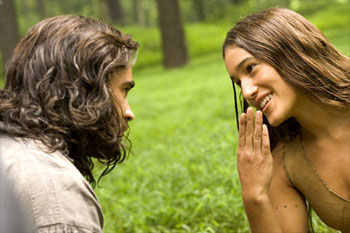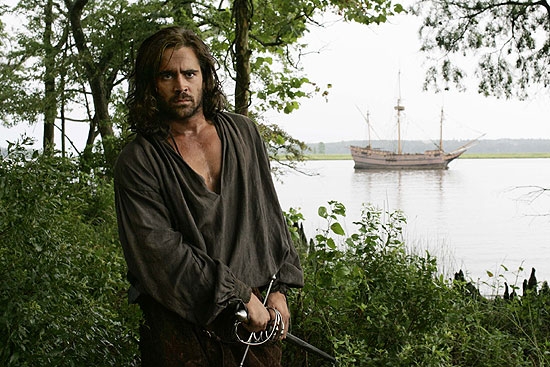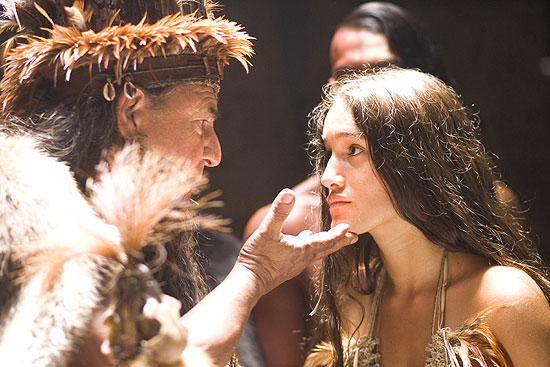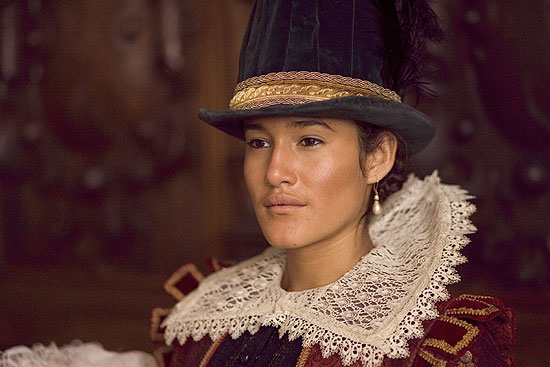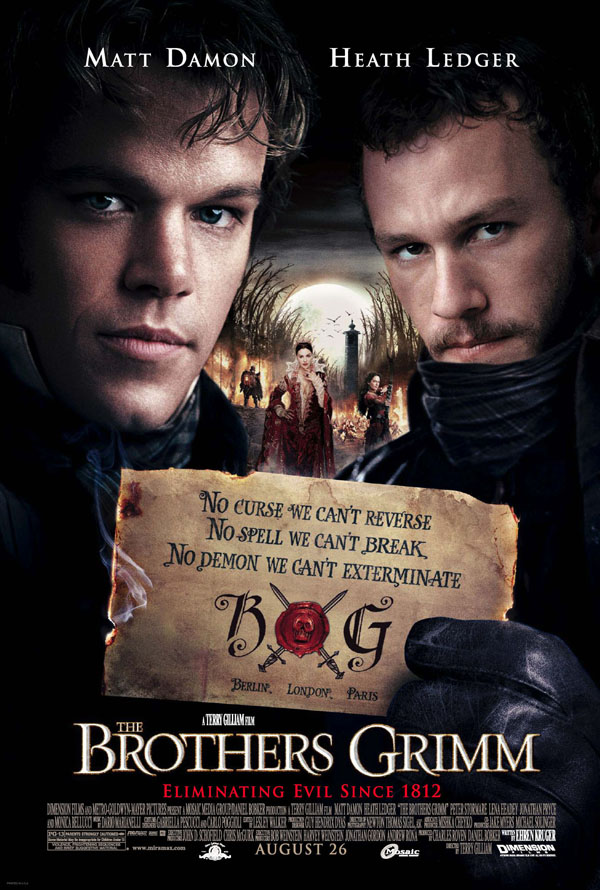“Right here is the essence of Malick’s existential outlook: the utter inconsequence of our short lives compared to the ancient landscape we inhabit and aim to conquer…The achievement of The New World is not to evoke a paradise lost, but to conjure the terrible beauty of the one we remain intent on destroying.” In another rave for an overlooked gem of 2005, Slate‘s Benjamin Strong ruminates on the “subtle greatness” of Malick’s New World.
Tag: Jonathan Pryce
It’s a Bond! It’s a Pirate! It’s…Superman!
The trailer bin runneth over this evening, with the english teaser for Daniel Craig’s Bond debut in Casino Royale, the new trailer for Pirates of the Caribbean 2: Dead Man’s Chest, and the full trailer for Bryan Singer’s Superman Returns. More summer fun than you can shake a stick at.
Another Green World.
“For a transitory enchanted moment man must have held his breath in the presence of this continent, compelled into an aesthetic contemplation he neither understood nor desired, face to face for the last time in history with something commensurate to his capacity for wonder.” – F. Scott Fitzgerald, The Great Gatsby
Well, that’s that — the 2005 round-up is out-of-date. If you’ve ever seen a Terence Malick flick (Badlands, Days of Heaven, The Thin Red Line), you can guess the contours of The New World — a Fall of Eden motif, a languid, dreamlike pace, resonant images of natural splendor, conflicted characters wrapped up in voiceover self-reflection, all punctuated with the occasional underwater swimming cam and chaotic sortie of Man against Man. (At my sparsely attended afternoon show, the guy to my left fell asleep, and the woman to my right walked out.) That being said, I thought this movie was the perfect match of director and material, and one of the most transporting and beautiful films I’ve seen in years. Sure, it has some serious historical issues, and sometimes dabbles dangerously with the noble savage schtick, one of Malick’s favorite tropes. But as a work of cinema, I think it may just be a masterpiece.
The year is 1607, and — with Capt. Christopher Newport (Christopher Plummer) at the helm and Capt. John Smith (Colin Farrell) in the brig — three English ships put to in a sun-dappled marshland, recently named after their late Virgin Queen. Short of food and enthusiasm after their exhausting Atlantic crossing, these new arrivals to the New World convey a tense hello to the “naturals,” construct a fort, plant a few token crops, and then begin frantically panning for gold and silver. When it soon becomes clear that the survival of the fledgling settlement will require both the forbearance and the trade of the nearby Powhatans, Smith is sent to visit the tribe in hopes of striking a deal. There, he is saved from a grisly death in the longhouse by the love, compassion, and curiosity of young Pocahontas (a radiant Q’Orianka Kilcher), daughter of the chief. (Lucky for Smith, and as the story goes, he gives her fever.)
Here is where some historical purists might start checking out (if they haven’t already), as the much-written-about romance between John Smith and Pocahontas, however enthroned in our overly happy tales of early Native American contact, probably didn’t happen. (The tale of his being saved may well be true, but it was probably an elaborate but traditional tribal ritual, one in which Chief Powhatan displayed his magnanimity to a potential rival by having a family member spare his life.) Similarly, the later relationship between Pocahontas and John Rolfe, America’s first (white) tobacco entrepreneur (Christian Bale, so that‘s how Batman made his money) had less to do with the chastened love story shown here than with an attempt to keep the peace — In Rolfe’s own words, he married “for the good of this plantation, for the honour of our countrie, for the glory of God, for my owne salvation, and for the converting to the true knowledge of God and Jesus Christ, an unbeleeving creature, namely Pokahuntas,” in that order.
Some other details rankle too. I’m not a colonial historian, but I highly doubt the brief reign of Capt. Wingfield (David Thewlis) ended exactly as it’s shown here. (Speaking of Thewlis and a la Thin Red Line, there are a number of recognizable actors skulking about Jamestown, including Ben Chaplin and Noah Taylor, and one film-fan cameo presiding over the Court of King James.)
But, really. To get too hung up on the history here is — quite literally — missing the forest for the trees. Like other Malick films, The New World is about impressions and evocations more than plot mechanics, and in that sense it’s a revelation. Through both natural sights and wondrous sound editing, the film does a stunning job of conveying the sublime strangeness of the other, and the magic and terror of an unfamiliar environment. In fact, the movie does it twice — Wes Studi has some powerfully haunting scenes in the third act, when, as an envoy of Powhatan, he is dumbfounded by the starkly manicured gardens of Europe. After the overgrown wilderness of Virginia, he — and we — might as well be on Mars. (Along those lines, I can’t remember the last time a film altered my perspective so much on the way out. After two and a half hours in this World, the Upper West Side seemed a bizarrely cluttered and unnatural realm for the rest of the evening.)
Terence Malick’s The New World is a masterfully crafted tale of discovery and transformation, passion and misunderstanding, intimacy and heartbreak, love and loss, and worlds Old and New. In short, it’s the best film of 2005 (and well-worth seeing on a big screen.)
A Troubled Sparrow.
Avast, ye scurvy dogs…The teaser for Pirates of the Caribbean 2: Dead Man’s Chest is now online, and it looks in keeping with the spirit of the first.
Grimm Fandango.
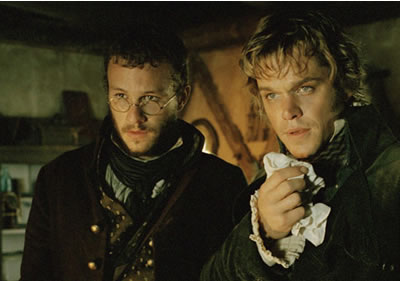
So, what’s good? Well, as you might expect, the best parts of the film are the Gilliamesque visual flourishes. When the movie involves enchanted forests or sleeping beauties or malevolent mirrors or little red riding…capes, Gilliam is in his element, and his kid-in-a-candy-store enthusiasm is infectious. If you’re a aficionado of the guy, these moments almost make the film worthwhile on their own…almost. Art direction aside, however, the effects often have a real budget FX-house look to them. (Memo to the studios: CGI and werewolves don’t ever seem to mix — cf. this, Underworld, American Werewolf in Paris, etc.) If your tale involves a man-wolf of any kind whatsoever, use an old-school make-up guy like Rick Baker or Rob Bottin.)
And, the story…oof. For what it’s worth, Matt Damon (Will) and Heath Ledger (Jakob) both acquit themselves admirably as the brothers/ghostbusters, and Damon in particular has a gleam in his eye that suggests he’d make an even worse movie if it meant he could continue to hang around the Gilliamverse. But the Brothers Grimm are cursed with a grafted-on fraternal backstory — Will wants to protect Jakob, Jakob wants Will to believe in him — that feels artificial from the start and forces them to spit out increasingly unwieldy chunks of character development as the movie progresses.
Worse, scenes just happen one after another with no feeling of narrative development at all. The brothers are in a dungeon, no…the forest, no…the dungeon again, and so on. The brilliant Jonathan Pryce is wasted in a subplot involving a French general that never makes one iota of sense. (Mackenzie Crook, a.k.a. Gareth from The Office, is also wasted, in more ways than one.) And Pryce’s henchman, the usually amiable Peter Stormare, singlehandledly ruins every scene he’s in with a grotesquely hammy performance of Olympian proportions — seriously, he makes Anthony Hopkins in Bram Stoker’s Dracula seem like Ralph Fiennes in The Constant Gardener. Conversely, the film could have used a good deal more of Monica Bellucci’s evil queen (but, to be fair, most films, and most endeavors in life, could stand to use more Monica Bellucci…the world would be a happier place for it.)
Ultimately, the Brothers Grimm is less grim than it is sadly pedestrian, and it has to be counted as a occasionally diverting swing-and-a-miss for Gilliam. But, I’d say that’s more due to the weakness of the material here than it is Gilliam, who shows flashes of his usual mojo. As such, I still have high hopes for Tideland, which, thankfully, is right around the corner.
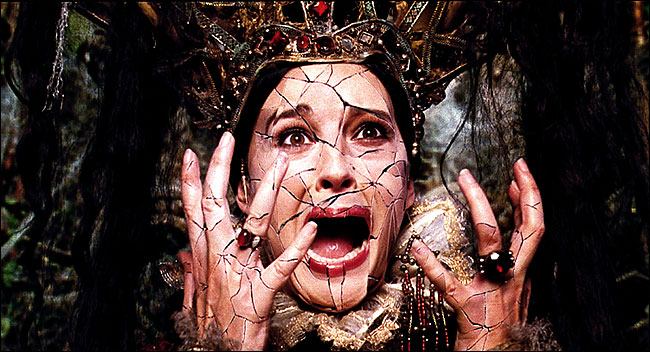
Mirror, Mirror, on the wall.
Worlds of wonder abound in the trailer bin today, including our first real look at Terry Gilliam’s The Brothers Grimm (looks a bit Munchausen-y…and I hope I can get used to Matt Damon’s accent) and this trippy voyage into Neil Gaiman’s Mirrormask. And, speaking of Gaiman, his and Robert Zemeckis’ forthcoming version of Beowulf has a cast: Ray Winstone, Anthony Hopkins, Brendan Gleeson, and Robin Wright Penn.
On War, Violence, and other Grimm Matters.
In this weekend’s movie bin, yet another new look at Stephen Spielberg’s War of the Worlds and a higher quality version of the trailer for David Cronenberg’s A History of Violence that premiered at Cannes last week. And, further into the future, the one-sheet for Terry Gilliam’s return, The Brothers Grimm, makes it online. Along with Heath Ledger, Matt Damon, and the lovely Monica Bellucci, Grimm also includes Peter Stormare and Jonathan Pryce. Seeing Sam Lowry back in the Gilliam-verse should be worth the price of admission by itself.
Grimm-Visaged War.
Argh. Terry’s Gilliam’s spate of studio trouble continues, with The Brothers Grimm getting pushed back a full year to November 2005. (Star Matt Damon suggests it may be due to FX.) It was already shaping up to be a particularly lousy fall film-wise, and this doesn’t help.
2003 in Film.
Well, it’s that time of year again, New Year’s Eve. So, without further ado…
[2000/2001/2002]
1. Lord of the Rings: Return of the King. If you didn’t see this pick coming, welcome to GitM. Ever since this blog started four years ago, I and it have been breathlessly awaiting Peter Jackson’s trilogy, and, boy, he delivered in spades. Even in spite of the pacing problems mandated by the TE running time, Return of the King is a marvel, the perfect ending to this epic for the ages and easily the best third-movie in a series ever. There’s so many ways these films could’ve turned out atrociously. (To take just three examples, think Brett Ratner doing the Pullman books, or the Wachowskis faltering on the early promise of The Matrix, or how Chris Columbus has made the magical world of Harry Potter so four-color monotonous.) The fact that they didn’t — that they instead shattered all expectations while staying true to Tolkien’s vision — is a miracle of inestimable value. In the post-Star Wars age, when epics have been replaced by “blockbusters,” and most event movies have been hollowed-out in advance by irony, excessive hype, dumbing-down, and sheer avarice, Peter Jackson has taught us to expect more from the cinema once again. Beyond all imagining, he took the ring all the way to Mordor and destroyed that sucker. So have fun on Kong, PJ, you’ve earned it.
2. Lost in Translation. It was fun for a while, there was no way of knowing. Like a dream in the night, who can say where we’re going? I still think Sofia Coppola cut a little close to the bone here in terms of autobiography, particularly given her recent split with Spike Jonze. Still, I find this tale of chance encounters and foreign vistas has a strange kind of magic to it, and it has stayed with me longer than any other film this year. Bill Murray comes into full bloom in a part he’s been circling around his entire career, and while I suspect he’ll get some stiff competition from the Mystic River boys come award-time, I’d say he deserves the Oscar for this one. Lost in Translation has its problems, sure, but at it’s best it’s haunting, ethereal, and touching like no other film in 2003.
3. Intolerable Cruelty. I expect I’ll be in the minority on this pick – This more-mainstream-than-usual Coen joint only got above-average reviews, and hardly anyone I’ve spoken to enjoyed it as much as I did. Still, I thought Intolerable Cruelty was a pop delight, 99.44% pure Coen confection. George Clooney is used to much better effect here than in O Brother (gotta love the teeth thing), and everyone else seems to be having enormous amounts of fun along the way. Light and breezy, yeah, but I thought it was that rare breed of romantic comedy that actually manages to be both romantic and hilarious. In the post-Tolkien era, it’s good to know we can always rely on the Coens for consistently excellent work, and I for one am greatly looking forward to The Ladykillers.
(3. The Pianist.) A 2002 film that I caught in March of this year, The Pianist is a harrowing and unique survivor’s tale that’s hard to watch and harder to forget (and I can’t have been the only person who thought post-spider-hole Saddam bore a passing resemblance to Brody’s third-act Szpilman.) Speaking of which, I said in my original review of Adrien Brody that “I can’t see the Academy rewarding this kind of understatement over a scenery-chewing performance like that of Daniel Day-Lewis in Gangs of New York.” Glad to see I was wrong.
4. Mystic River.: The waters of the Charles are disturbed, something is rotten in the outskirts of Boston, and it’s safe to say the Fates are wicked pissed. Much like In the Bedroom in 2001 (and Clint Eastwood’s own earlier Unforgiven), Mystic River is inhabited and propelled by a spirit of lumbering, impending, inexorable doom…what Legolas might call a “sleepless malice.” It is that existential malice, rooted so strongly in local color, that gives this River its considerable power. And unlike Cold Mountain, where stars stick out here and there with showy turns, the ensemble cast of Mystic River never overwhelm the strong sense of place at the heart of the film — indeed, they sustain it with consistently excellent and nuanced performances. Big ups for all involved, and particularly Tim Robbins and Marcia Gay Harden.
5. X2: X-Men United. Laugh if you want, but I can’t think of any other movie where I had more fun this year. Arguably the most successful comic film since Superman 2, X2 improved over its rather staid predecessor in every way you can imagine. From Nightcrawler in the White House to the assault on the mansion to Magneto’s escape to Ian McKellen and Brian Cox chewing the scenery in inimitable fashion, X2 was ripe with moments that seemed plucked directly out of the comics, if not straight out of the fanboy id. To me, my X-Men.
6. Master and Commander: The Far Side of the World. It’s a long title, it’s a long movie. But a good kinda long…in fact, as I said in my initial review, it seemed to move to the langorous rhythms of a long sea voyage, one that I may not take again for awhile, but one that I still thoroughly enjoyed. And I’ll say this for Russell Crowe…somewhere along the way in each of his films, I tend to forget that he’s Russell Crowe. His Capt. Jack Aubrey was no exception.
7. The Matrix Reloaded. If we can, let’s try to forget the resounding thud on which the Matrix trilogy ended. For a time there, five short months, the fanboy nation was abuzz in trying to figure out exactly where the Wachowskis were going after the second chapter. Previous Matrices, previous Ones? How was Neo manipulating the real world? What was Smith up to? It all seems kinda pedestrian now, of course, but at the time Reloaded was a sequel that outdid its predecessor in pizazz while building on the questions that animated the first film. I won’t defend the first forty-five minutes or the ridiculous rave scene. But, right about the time Hugo Weaving showed up to do what he does best, Revolutions found a new gear that it maintained right up until the arc-twisting Architect monologues at the end. And, as far as action sequences go, it’s hard to beat the visceral thrill of the 14-minute highway chase.
(7. The 25th Hour.) Another 2002 hold-over, and the best film yet made about the aftermath of 9/11, (which only seems natural, given that it’s by one of New York’s finest directors.) Haunted by might-have-beens, what-ifs, and what-nows, The 25th Hour feels real and immediate in its attempt to grapple with both 9/11 and the slamming cage in Monty Brogan’s future. Only once, with the Fight Club-like fracas in the park, does the film flounder. Otherwise, it’s a thought-provoking meditation throughout.
8. The Last Samurai: Breathtaking New Zealand landscapes, furious suicide cavalry charges, rustic untainted pre-modern villages…no, it’s not Return of the King, just the warm-up. [And, as I said earlier, I prefer my anti-modern nostalgia hobbit-like (peaceful, environmental, epicurean) rather than samurai-ish (martial, virtuous, stoic)] While I think Cold Mountain got the Civil War right, I ultimately found this film to be the more engaging historical epic of December 2003. So take that, Miramax.
9. Finding Nemo. Oh, my…I almost forgot about Nemo. (Just like Dory sometimes.) Pixar’s films have been so consistently good that there’s a danger of taking them for granted. They hit another one out of the park in this tale under the sea. As with the Toy Stories and Monster’s Inc. before it, just an all-around solid kid’s movie filled to the brim with eye-popping wonders.
10. Dirty Pretty Things. Although it becomes more conventional as it goes along, DPT starts very well, features a star-making turn by Chiwetel Ejiofor, and manages to include a Audrey Tautou performance that isn’t fingernails-on-the-blackboard bothersome. As with Hugh Grant in About a Boy last year, that deserves plaudits if nothing else.
11. L’Auberge Espagnole. Hmm…two Tautous in a row….perhaps I should stop playa-hatin’. At any rate, while Lost in Translation trafficked in existential detachment, L’Auberge Espagnole showed the fun Scarlett Johannson could’ve been having, if she’d just lighten up and get out of the hotel once in awhile. This paean to the pan-Continental culture of the EU captured the excitement and possibilities of youth in a way that was both sexier and funnier than any of the teen shock-schlock emanating from our own side of the pond. Road Trippers, take a gander.
12. The Quiet American. A bit by-the-numbers, perhaps, but Phillip Noyce’s take on Graham Greene’s novel was blessed with timeliness and two great performances by Michael Caine and Brendan Fraser, both of whom expertly exemplified their homelands’ diplomatic tendencies without becoming overly tendentious. I’m not sure if giving away the end before the credits was the right way to go, but otherwise the film rarely falters.
13. The Fog of War. From Alden Pyle to one of his real-life counterparts, Robert McNamara, who now only remains quiet when questioned about his own culpability over Vietnam. Despite this central failing, a spry McNamara succeeds in penetrating the fog of time to examine how he himself became lost in the maze-like logic of war. If you can withstand the frequent Phillip Glass-scored barrages, it’s worth a see.
14. Pirates of the Caribbean. My initial upbeat opinion on this one has faded somewhat over the autumn and winter months. Still, at the time PotC was a surprisingly good summer popcorn flick, and rollicking fun for about two of of its two and a half hours. Johnny Depp and Geoffrey Rush were great fun, Keira Knightley and Orlando Bloom make for great eye candy, and Sam Lowry was in it. I’m just going to assume it was much, much better than The Haunted Mansion.
15. The Station Agent. Ok, it’s got Sunday afternoon bored in front of the IFC Channel written all over it. And not much happens for the last forty minutes or so. Still, The Station Agent proves that if you write a few interesting, well-rounded, complicated characters and throw them in a situation together, the story almost writes itself.
16. American Splendor. The first of a couple of movies that I seemed to like less than most people. Sure, I thought Splendor was well-done, but it never really grabbed me, and I’d be more impressed by its breaking-the-fourth-wall daring if it hadn’t already been done twenty-five years ago in Annie Hall. (Similarly, I thought this kooky underground comic world was captured better in Crumb.)
17. Spellbound. Could you use it in a sentence? Again, people seemed to love this flick, and I was definitely entertained by it. But, when you get right down to it, what we have here is kids spelling for two hours…I couldn’t imagine ever sitting through this one again. And, as I said in my original post, I thought Spellbound was more manipulative than it lets on. Less kids and more complexity would’ve made the film more satisfying. S-A-T-I…
18. Cold Mountain. I’ve already written about this one at length today, so I’ll just refer you to the review. To sum up, occasionally beautiful but curiously uninvolving and way too top-heavy with star power distractions.
19. 28 Days Later. Great first third, ok second third, lousy finish. The film was much more interesting before our team makes it to Christopher Eccleston’s countryside version of Apocalypse Now. And I can’t stand horror movies where the protagonists make idiot decisions, like driving into tunnels for no reason or taking downers when surrounded by flesh-eating, spastic zombies. But the cast — particularly Brendan Gleeson — do yeoman’s work, and the opening moments in an empty London are legitimately creepy.
20. T3: Rise of the Machines. Before he was the Governator, he was the T-1000 one (last?) time. Let’s face it, this movie is mainly here by virtue of not being bad. I mean, c’mon, it was better than you thought, right? Well, me too. Claire Danes was insufferable, but Nick Stahl and Kristanna Loken give it the ole college try, and the story takes a few jags that weren’t immediately apparent. Bully to Jonathan Mostow for not running James Cameron’s franchise into the ground.
As Yet Unseen: 21 Grams, Bad Santa, The Cooler, House of Sand and Fog, In America, Love, Actually, Something’s Gotta Give.
Best Actor: Bill Murray, Lost in Translation. Sean Penn, Mystic River. Chiwetel Ejiofor, Dirty Pretty Things. Michael Caine, The Quiet American.
Best Actress: Scarlett Johannson, Lost in Translation (who’s sort of here by default…I expect competition from Diane “Something’s Gotta Give” Keaton, Samantha “In America” Morton, Jennifer “House of Sand and Fog” Connolly, and Naomi “21 Grams” Watts.)
Best Supporting Actor: Tim Robbins, Mystic River, Sean Astin, Return of the King, Billy Boyd, Return of the King, Ken Watanabe, The Last Samurai.
Best Supporting Actress: Renee Zellweger, Cold Mountain, Marcia Gay Harden, Mystic River, Patricia Clarkson, The Station Agent.
Worst Films: 1. Gods and Generals, 2. Dreamcatcher, 3. Scary Movie 3. 4. Underworld.
Worst Disappointments: 1. The Hulk, 2. The Matrix: Revolutions, 3. Kill Bill, Vol. 1.
Ho-Hum: 1. LXG, 2. Bubba Ho-Tep, 3. Big Fish, 4. Masked and Anonymous. 5. Tears of the Sun. 6. Veronica Guerin, 7. The Core.
Brothers and Arms.
 Dark Horizons and Dreams (a quality Terry Gilliam fansite) gets the first look at The Brothers Grimm (a.k.a. Heath Ledger and Matt Damon.) I for one am looking forward to seeing the inimitable Jonathan Pryce and the incomparable Monica Bellucci. Also in cinema news, for those of you who shared my confusion over the weekend’s Arthur pics, Clive Owen discusses the film, and why he’s apparently running around in legionnaire’s garb.
Dark Horizons and Dreams (a quality Terry Gilliam fansite) gets the first look at The Brothers Grimm (a.k.a. Heath Ledger and Matt Damon.) I for one am looking forward to seeing the inimitable Jonathan Pryce and the incomparable Monica Bellucci. Also in cinema news, for those of you who shared my confusion over the weekend’s Arthur pics, Clive Owen discusses the film, and why he’s apparently running around in legionnaire’s garb.

